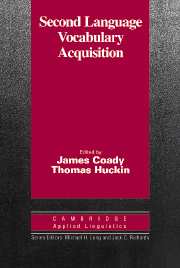Book contents
- Frontmatter
- Contents
- List of contributors
- Series editors' preface
- Acknowledgments
- I SETTING THE STAGE
- II CASE STUDIES
- III EMPIRICAL RESEARCH
- Chapter 7 Tracking the acquisition of L2 vocabulary: The Keki language experiment
- Chapter 8 Rare words, complex lexical units and the advanced learner
- Chapter 9 Vocabulary enhancement activities and reading for meaning in second language vocabulary acquisition
- IV PEDAGOGY
- V SUMMING UP
- Author index
- Subject index
Chapter 8 - Rare words, complex lexical units and the advanced learner
Published online by Cambridge University Press: 05 October 2012
- Frontmatter
- Contents
- List of contributors
- Series editors' preface
- Acknowledgments
- I SETTING THE STAGE
- II CASE STUDIES
- III EMPIRICAL RESEARCH
- Chapter 7 Tracking the acquisition of L2 vocabulary: The Keki language experiment
- Chapter 8 Rare words, complex lexical units and the advanced learner
- Chapter 9 Vocabulary enhancement activities and reading for meaning in second language vocabulary acquisition
- IV PEDAGOGY
- V SUMMING UP
- Author index
- Subject index
Summary
Introduction
It is often acknowledged in the language teaching community that native speaker-like competence is neither a very realistic nor necessarily a desirable goal for the average adolescent or adult foreign language learner. Some learners, however, do manage to attain a proficiency level at which it is difficult to distinguish their performance subjectively from that of native speakers. If this is rare in the case of pronunciation, receptive lexical performance more frequently displays apparent native characteristics. The research presented here was aimed at determining how “passive” knowledge of rare words and complex lexical units by advanced learners increases with level of study and eventually compares with that of native speakers.
Passive vocabulary
It should be made clear at the outset what is understood here by “passive” knowledge. Many a paragraph in the literature is devoted to “what it means to know a word,” but passive knowledge can best be described by considering what happens when an utterance is comprehended: Using phonetic clues present in the speech continuum, the phonological representation [significant) of a lexeme is accessed, which in turn permits access to the representation of its meaning (signifié). Whether this semantic representation leads to another, extralinguistic and more abstract “higher” representation or concept is relatively unclear at present in the semantic or psycholinguistic literatures (see, for instance, Cruse, 1988, and Segui and Beauvillain, 1988, respectively), but the ultimate aim of comprehension is that the hearer should form a representation of the speaker's communicative intent, not just of a juxtaposition of lexical and grammatical signifies.
- Type
- Chapter
- Information
- Second Language Vocabulary AcquisitionA Rationale for Pedagogy, pp. 157 - 173Publisher: Cambridge University PressPrint publication year: 1996
- 9
- Cited by



